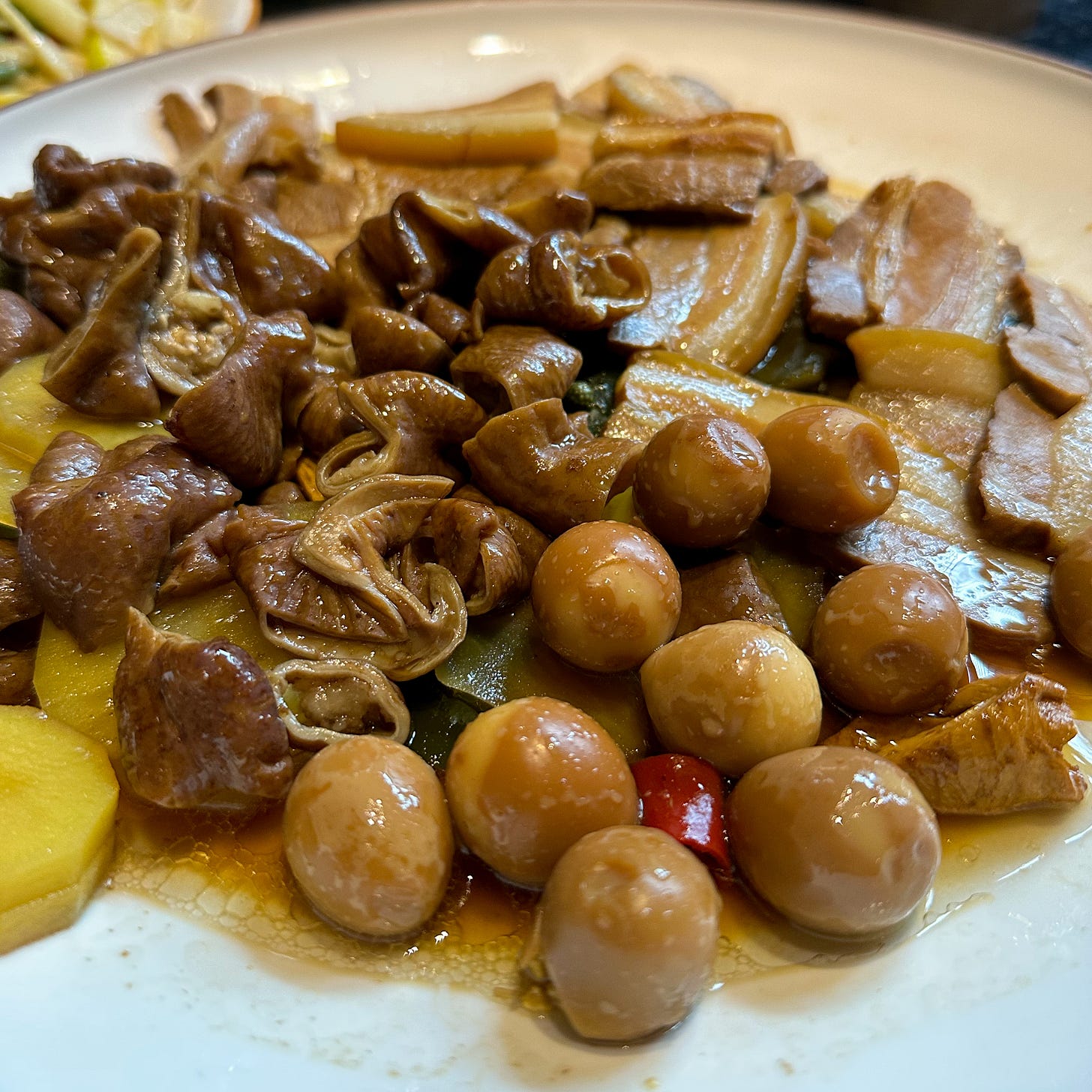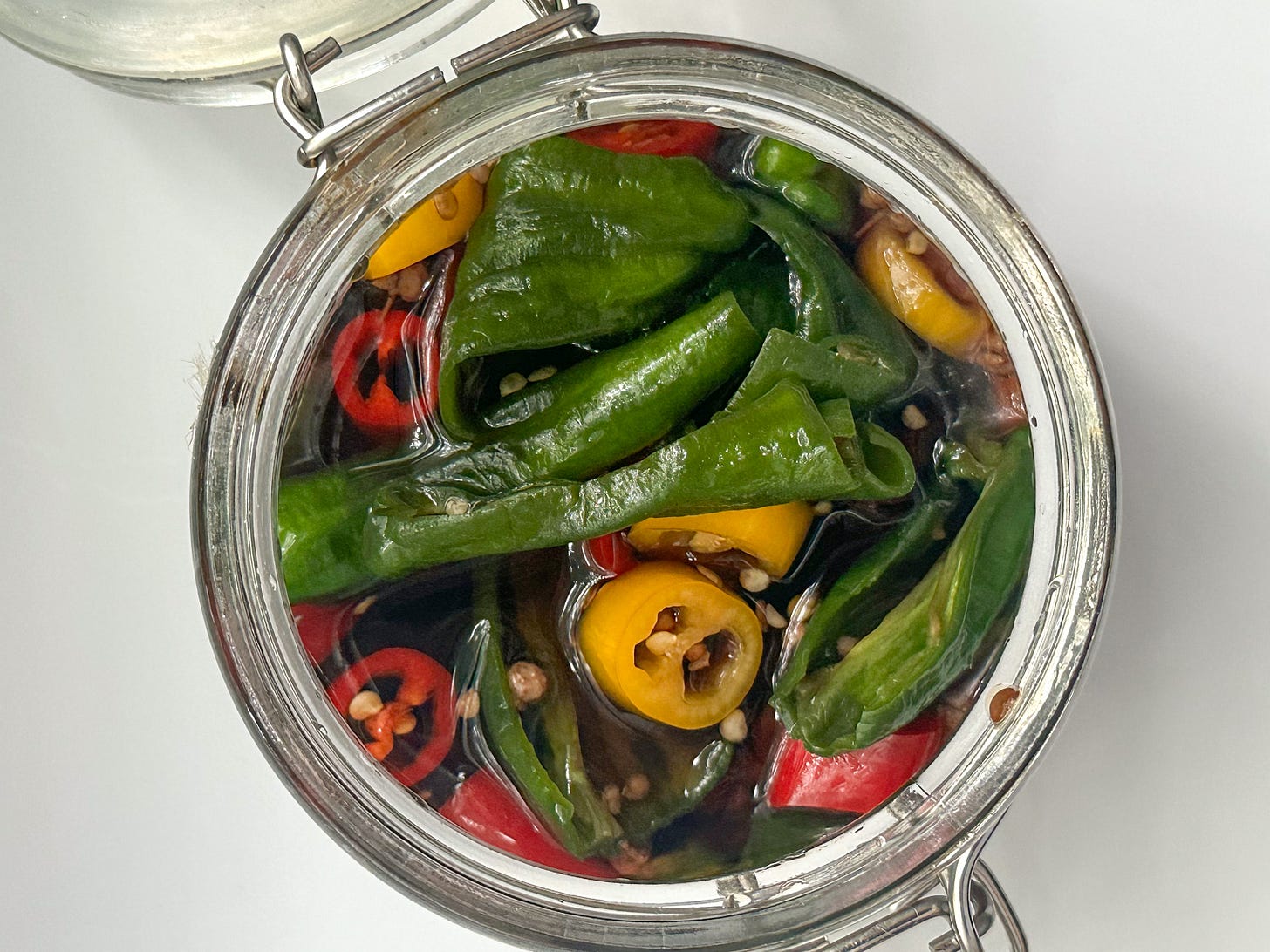Hello there! After the little dessert break, I’m excited to share another recipe centered around soy sauce. The good part is that it requires minimum cooking on warm days, and the better part? it works for three different ingredients. I guess this is what we call a no-recipe recipe.
A few things you can make from the archive for summer: Sichuan cold noodles; smashed cucumber 2 ways; Sichuan jelly noodles (liang fen), or a more vinegary pickle like these radish and cucumber pickles.
To explore what I call the best trio of a simple pantry meal (i.e., soy sauce, rice, and egg), the idea of soy sauce-marinated eggs popped up almost instantly. These eggs have been trending on social media for the last few years, known either as Korean mayak eggs (Mayak Gyeran, or gyeran-jangjorim) or ramen eggs (Ajitsuke Tamago). While their origin is somewhat blurred, many cuisines have their interpretation of combining eggs and soy sauce. I made the Korean version when I worked at my last job. Just like many the viral recipes I’ve tried since pandemic—from Dalgona coffee to green goddess cabbage—each has its charm of what you would call a good effort-to-impressiveness ratio.
The trend made it to Chinese social media, where I’ve seen recipes with Chinese tweaks, such as substituting mirin with Chinese vinegar and adding spices like star anise. It makes perfect sense since it's essentially a cold and simpler version of soy-braised eggs, or lu dan (卤蛋), a popular Chinese breakfast and snack. Lu dan, or tea eggs when tea leaves are added, are simmered and soaked in a soy sauce-based master stock with various spices and aromatics. 'Lu' (卤) is a Chinese technique for poaching and braising meat and vegetables in a rich master stock, which could be stored and used for years. You can basically lu-braise anything from tofu, lotus root to pig ears.
With this notion of a simpler version of master stock, I was certain it would work for other ingredients. Edamame, of course! One common way to prepare edamame (young soybeans) is to boil them with soy sauce and spices, known as five-spiced edamame (五香毛豆). This classic drinking snack is perfect for the season and reminds me of hot summer nights spent at “leng dan bei” (冷淡杯) or "ye pijiu" (夜啤酒) in Sichuan. These street stands where people go enjoying draft beer and various cold eats like lu dishes (lucai 卤菜) and barbecues.
You can also use this sauce to marinate chili peppers as well. Traditionally, long green chili peppers are used, as demonstrated by Chef Wang Gang. They need a bit longer time to marinate but make a nice appetizer for rice and noodles.
Soy-marinated eggs
Ingredients
6 medium-sized eggs
Serve with fresh chopped chilis or chili oil, sesame seeds, and scallions
For the Sauce:
5 tbsp (1/3 cup) light soy sauce
1 tbsp sugar
1 tbsp Chinese black vinegar
2 dried chilis, deseeded
1 star anise
3 garlic cloves, slightly crushed
250 ml (1 cup) water
Instructions
Bring a pot of water to a light boil, carefully lower the eggs, and boil over a light simmer for 6-7 minutes. Then remove and add them to a bowl of ice water. Once the eggs are cooled, peel them carefully.
To make the sauce: In a small pot, add light soy sauce, sugar, dark rice vinegar, star anise, garlic and dried chilis. Bring to a light simmer and cook until the sugar dissolves. Let cool completely.
In a container or bowl, add the eggs, then cover with the sauce and water, making sure the eggs are submerged. Cover with plastic wrap and let marinate for a few hours or overnight. Store in the fridge for 2-3 days. Cut the marinated eggs in half and serve with freshly cooked rice, noodles, garnish with chilis, scallion and sesame seeds.
Soy-marinated edamame
Cook 300 g (10 oz) frozen store-bought edamame (unsalted, with shell, I used the brand ITA-SAN) according to package instructions in a pot or microwave, then drain and let cool. Add the sauce (recipe above) and water, optionally with 1 tsp Sichuan pepper, and store in the fridge. Enjoy after a few hours.
Soy-marinated Peppers
Remove the core of 200 g (7 oz) chili peppers of your choice (I used Spanish padrón peppers), cut into small pieces or rings. Add 1/4 tsp salt, toss to combine. Let sit for 30 minutes. Then add the sauce with water, optionally with 1 tsp Sichuan pepper, and store in the fridge. Enjoy after overnight or 1-2 days for the flavors to develop.









I love this!!